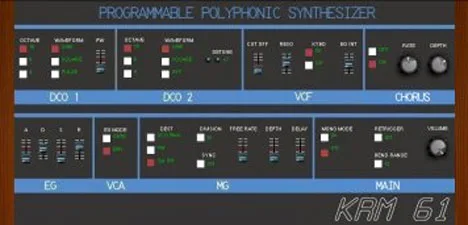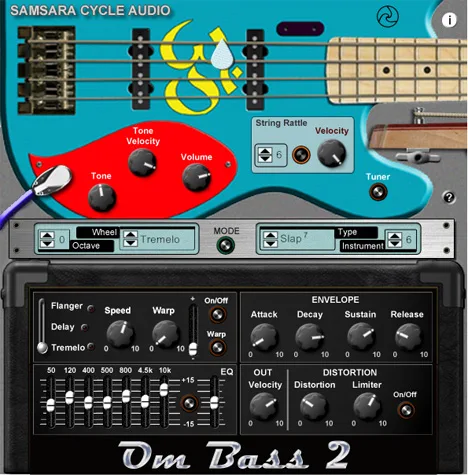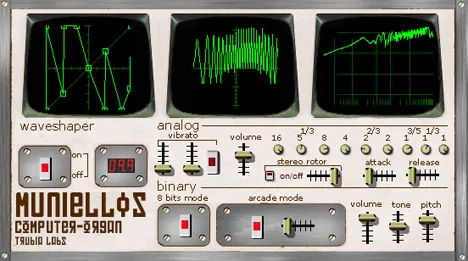The KRM61 is not just a VST plugin, it’s a real journey back in time to the golden era of synthesizers. Developed by Kriminal, this virtual instrument is a worthy emulation of the iconic Korg Poly61 synthesizer released in 1982. The Korg Poly61 was one of Korg’s first polyphonic synthesizers to use digital oscillators (DCOs), combining the stability of digital with the warmth of analog filters and VCAs. The KRM61 strives to recreate this unique sound character, offering users an authentic vintage experience without the need to find and maintain original equipment.
KRM61’s Korg Poly61 emulation allows you to access the classic tones that defined the sound of 80s music, from atmospheric drops and textures to punchy bass lines and bright leads. This plugin will be a valuable addition to the arsenal of any musician or producer who appreciates analog sound and vintage aesthetics.
Main Features and Sound Architecture
The heart of the KRM61 is the carefully modeled architecture of the original Korg Poly61. The plugin recreates the key components that formed the unique sound of this synthesizer:
- Two Digital Oscillators (DCOs): The KRM61 has two DCOs, each with its own characteristics. DCO1 offers a choice between a sawtooth wave, square wave, and pulse wave, with pulse widths that can be modulated. DCO2 generates both sawtooth and square waves. Combining these oscillators allows you to create rich and complex tones.
- Analog filter (VCF): After the oscillators, the signal passes through a 4-pole analog low-pass filter. This VCF is critical to the warm, vintage sound of the KRM61, allowing it to cut high frequencies and add resonance to produce characteristic tones.
- Envelope Generator (EG): The KRM61 utilizes a single ADSR (Attack, Decay, Sustain, Release) envelope generator that jointly controls both the filter (VCF) and the amplifier (VCA). This is a classic solution that affects the dynamics and development of sound over time.
- Modulation generator (MG or LFO): To add movement and life to the sound, the KRM61 is equipped with a modulation generator (low-frequency oscillator) in the shape of a sine wave. This LFO can be set to modulate the pitch of both DCOs, the pulse width of DCO1, or the filter cutoff frequency, allowing you to create vibrato, tremolo, wah-wah, and other dynamic modulations.
Differences from the Original and Modern Adaptations
Although the KRM61 is a faithful emulation, there are some differences from the original Korg Poly61 that are adaptations for the modern digital environment rather than drawbacks:
- The chorus effect instead of unison: The original Korg Poly61 had an 8-voice unison mode. The KRM61 replaces this mode with a built-in chorus effect. Chorus adds width, volume, and movement to the sound, which is extremely useful for creating thick pads, strings, and other atmospheric tones. This is a modern solution that is often more flexible in the mix.
- No arpeggiator: The original had a built-in arpeggiator. The KRM61 does not have one. However, this is not a significant issue for modern users, as most digital audio workstations (DAWs) have their own powerful and flexible MIDI arpeggiators that can control the KRM61, offering even more options than the original built-in arpeggiator.
Who is the KRM61 for?
The KRM61 is the ideal instrument for:
- Musicians and producers who are passionate about the vintage synth sound of the 80s and want to recreate it in their tracks.
- Those looking for a high-quality polyphonic synthesizer to create warm pads, classic bass lines, atmospheric soundscapes, and melodic leads.
- Students and enthusiasts who want to learn the basics of sound synthesis using the classic synthesizer architecture without having to invest in expensive hardware.
- Anyone who appreciates free but high-quality VST instruments.
KRM61 by Kriminal is a great opportunity to add a piece of synth music history to your virtual studio. Its intuitive interface and authentic sound make it a pleasure to use and an extremely musical instrument. Give the KRM61 a try and discover the wealth of vintage polyphonic tones that can inspire new musical ideas.
Specifications.
- Developer: Criminal
- Emulation: Korg Poly61 (1982)
- Format: VST
- Operating system: Windows (32-bit)



